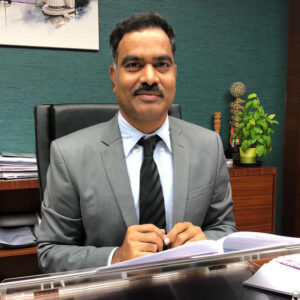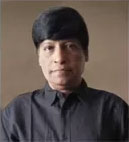
Mr Sanjay Khandare, IAS of the 1996 cadre is one administrator whose brilliance and commitment comes through eloquently in any portfolio he is saddled with. The huge body of his work carries the signature of his technical competence that he has applied so effectively in his 25+ years of career. It is a measure of his character that he does his work silently and unsung. His philosophy: Let your work speak for itself.
Tough times, as the cliché goes, do not last but tough people do and when that element of toughness surfaces from beneath the veneer of a personality that is self-effacing and lets it work speak more than words, you have a dyed-in-the-wool administrator of the merit of Mr Sanjay Khandare. An IAS officer of the 1996 cadre, Mr Khandare brings to office consummate experience in Government Management, Project Management, Strategic Planning and Change Management. As someone who currently, he holds the post of Principal Secretary, Public Health Department, he has straddled all his postings at the Central and State level with high degree of competence.
What sets Mr Khandare apart is his proficiency and prowess in handling matters that call for profound technical expertise. A B Tech degree in Agricultural Engineering and M Tech in Industrial Engineering has ensured that he has shouldered all such responsibilities without any ado, without any craving for covets; and whenever they came to him, he accepted them with a quiet grace befitting the sagacity that he politely attributes to his “judicious and conscientious” nature.
Those who have little idea about the rough and tumble of administration and the nitty gritty required to make it to the challenging climes of the administrative services, will be surprised to know that Mr Khandare, who could have easily stitched a thriving career in his core area of technical expertise, chose to set sail in a radically different calling that was more by accident than design. While working with Mahindra & Mahindra and staying with some bachelors, he was urged to explore the possibility of appearing for the UPSC and eke out a career in administration. As he says, in hindsight, it was a wise decision. Besides, there was this comforting thought that he could bring his technical credentials to the professional pilgrimage he had so assiduously decided to undertake.
“Responsibility is a significant word in my lexicon. I could see that I could harness it in a medium that offered a unique scope. In my over 26 years of professional odyssey, I feel indebted to destiny I chose this career. I have no regrets whatsoever. I feel consolidated that while boot-strapping in what many would believe was an alien realm, I was able to mobilize my technical insights in most of my postings.” He pinpoints to his tenure as Member Secretary of Maharashtra Pollution Control Board (MPCB) around 2008 and his previous posting as the CMD, MahaGenco.
He particularly relishes his role in an environment that calls for rigorous interaction and enables creating strong, sustainable policies. “Of course, human resources are the most important thing, as well as giving steady management. Even though it’s a government company, it can be professionally managed with the experience and expertise that I have gained. It was challenging but also fulfilling to handle a responsibility when the power sector was going through some trying times. “There are a lot of things which can be done to prepare the organisation for the future, building on its strength to survive in these challenging and competitive times. It’s a good opportunity for me to show that I can perform, and that we as an organisation can perform,” he says.
Destiny ordained that his penchant to take challenges head on come to the fore in his very first posting as the Sub Divisional Magistrate (SDM) in the holy town of Pandharpur where he broke the unholy nexus and monopoly of the ‘Badwe’ – the touts and middlemen operating in the temple precincts. He registered offences against them including a self-styled godman for misappropriation of funds, regularised the contractual workers and restored the sanctity of the place. “It was quite a eventful start to my career,” he recalls, adding, “when you do such work, you obviously have to deal with pressures and pulls and you need to be resilient enough to overcome.”
One faculty that stands out from his wide bandwidth is his canny ability to adapt and apply to various portfolios that he has held in his illustrious 26-year-career. He makes it a point to delve deep into all issues – irrespective of the subject – study them and grasp them. “It has been a part of my learning curve. Be it Economy, Finance, Health or any other subject. I have evinced keen interest in those, trying to come to grips with matters relating to regulations, compliances, administration and overall governance.” This has always been a quintessential part of his personal policy regimen that he has never jettisoned even in the wake of most demanding circumstances. It brought the best out of him.
In this context, Mr Khandare reminisces his stint as the Collector of Nandurbar district, a predominantly (then) under-developed and backward tribal belt which was seeing a ferment against the Sardar Sarovar Project. The ambitious dam being built there was being opposed tooth and nail by social activist Ms Medha Patkar and her group. The work on the dam had run into rough weather, dragging on for well over 10-15 years, stopped at height of 91 Met. There was a Supreme Court Monitoring Committee to ensure proper rehabilitation and there was a big question mark over the rehabilitation due to opposition of tribals led by Ms Patkar. Every year, rains brought the areas under submergence and it was quite a task to shift the tribals to a safer place. Handling the situation with the tact a diplomat would envy, Mr Khandare smothered the anti-dam agitation successfully. He managed to wean an important aide of Ms Patkar to his side and convinced her about the need for land acquisition and displacement, once earned her confidence and trust. Finally, Tribals accepted rehabilitation and the Dam could proceed with construction. In fact, so credible and compelling were his efforts that Ms Patkar herself acknowledged and lauded them at a function later. As he recalls with a smile, “I didn’t realise how successfully I had handled the agitation until 5-6 years later, legislator Ramraje Nimbalkar said that my picture should also be hung alongside his for the successful completion of Sardar Sarovar Dam.”
An intrinsic part of Mr Khandare’s persona is his natural craft in handling contradictions that accrue from the onerous duties he carries out. “I have always been a judicious and conscientious person. It is entirely up to you whether to make compromises or stand firm when faced with such situations. I have stood through the thick and thin in these years while fighting injustice for the overall good. I am not the one to hanker for any covets. I am basically a silent person and let my work do all the talking. If I am required to add value to the responsibilities that I shoulder, I am prepared to take risks.”
Having worked in a compulsive public domain, Mr Khandare says it has metamorphosed him into a different man. “I have gained in my personality. I am more extrovert, outgoing now which blend with the intuitiveness that I feel I am blessed with. I have never ached for accolades. Whenever they came my way, I accepted them gracefully without publicizing them. I never make a conscious effort to project myself and pitchfork into situations that show me as some kind of a hero. No tom tomming for me.”
As thoroughbred technical personnel, Mr Khandare specialises in Infrastructure. As the Additional Metropolitan Commissioner of MMRDA, he executed large projects like the Mumbai TransHarbor link (MTHL). He was instrumental in environmental tendering, design and construction of the iconic project in just 4 years. “When I took over, the work had been completed around 30% but the actual construction was under his supervision. It was one project that gave him satisfaction as he could deploy also his technical know-how. True to his nature, he never showcased it as some kind of a personal milestone. As the Secretary, Civil Supplies, he worked with just a handful of people during the Covid first phase lockdown to make sure that foodgrains under the Public Distribution system (PDS) reached all shops. While being the CEO at Kolhapur ZP, he provided computers to over 100 schools and increase the quality of education. As he says with his characteristic unassuming smile: “I did all the spade work but someone else rode on the credit. That’s fine by me.” Come technical issues or those relating to financial, environmental, operational or man-management, Mr Khandare was equal to them all, thanks to his trait of adapting to all situations. Having said that, Infrastructure, Industries and other areas that pre-eminently demand technical adequacy are his forte.
When asked about his leadership style and managing his team within a large organisation, Sanjay reveals it’s about not reacting to things immediately. “I help people to open up to ideas and encourage a safer, collaborative team approach, and guide people in terms of their strategies and goals when necessary. This is my philosophy. I’m more of a team man. Probed what lends serenity to his otherwise tough exterior, he says music provides a soothing balm. “I groove on Rafi and Kishore’s songs. An intense game of tennis twice a week in the morning is good enough to rejuvenate his body and soul. As Treasurer of the ATC in Pune, he ensures the connect with and the spread of the game.
That perhaps also explains why Mr Khandare is adroit at handling all serves – both on and off the field.

A Column By
Raju Korti – Editor
The Resource 24X7
A Journalist With 4 Decades of Experience With Leading Media Houses.
